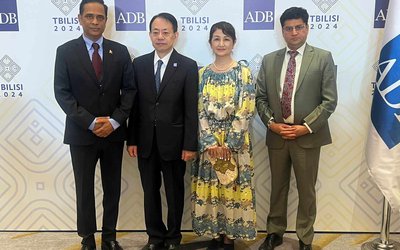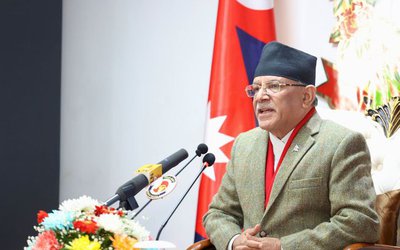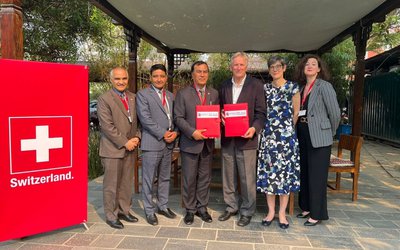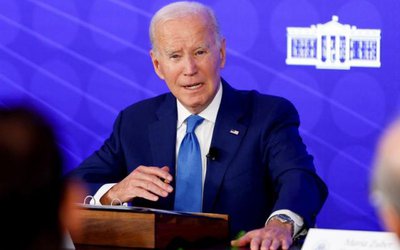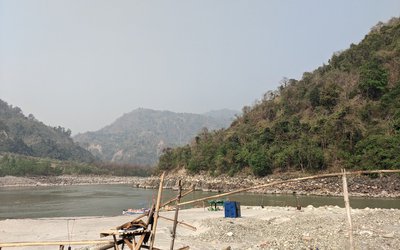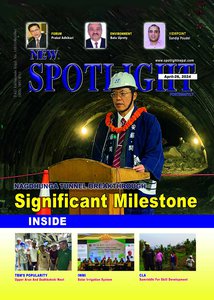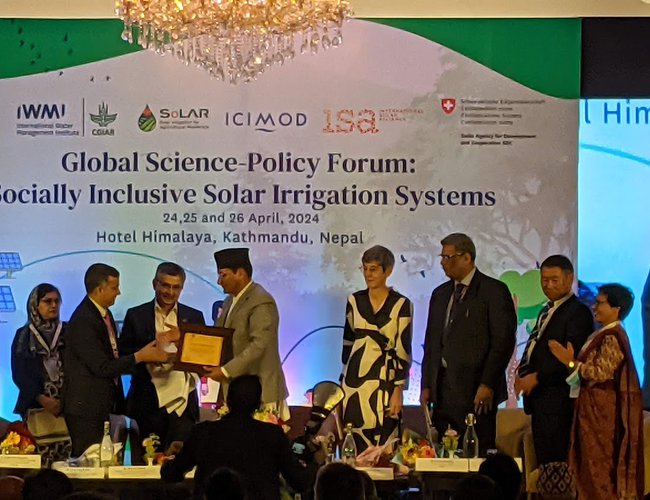
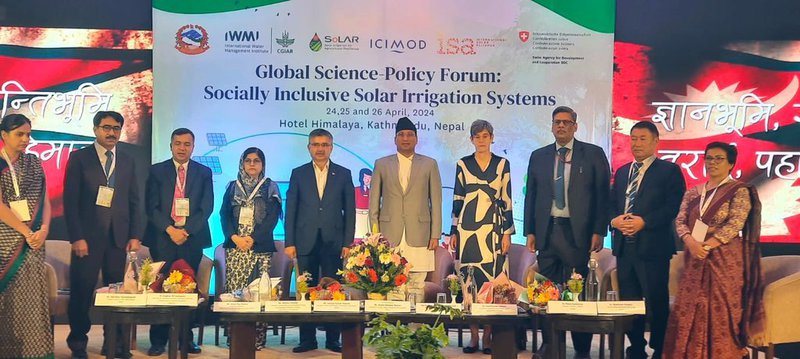
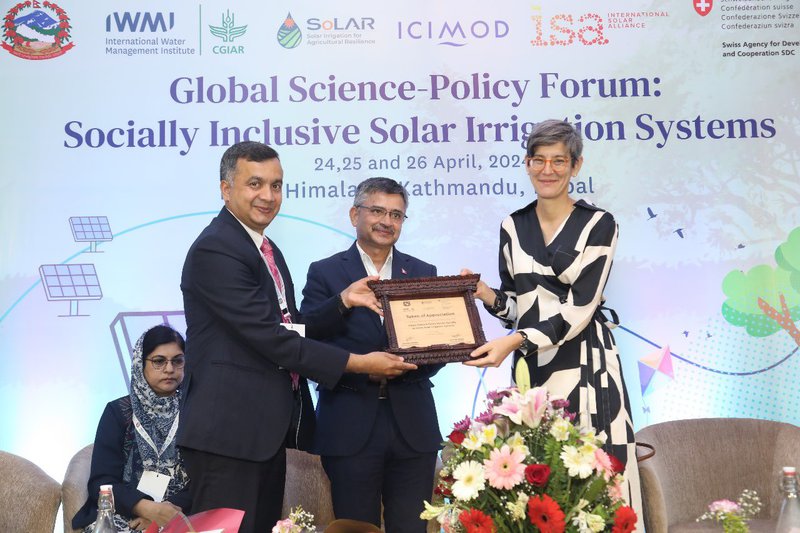
The issue of climate change poses a significant challenge globally, particularly for countries in the South that are experiencing extensive climate variability and facing high risks due to inadequate climate preparedness and heightened fragility. To address this concern, the International Water Management Institute (IWMI) convened an international conference on Socially Inclusive Solar Irrigation Systems aimed at mitigating these risks.
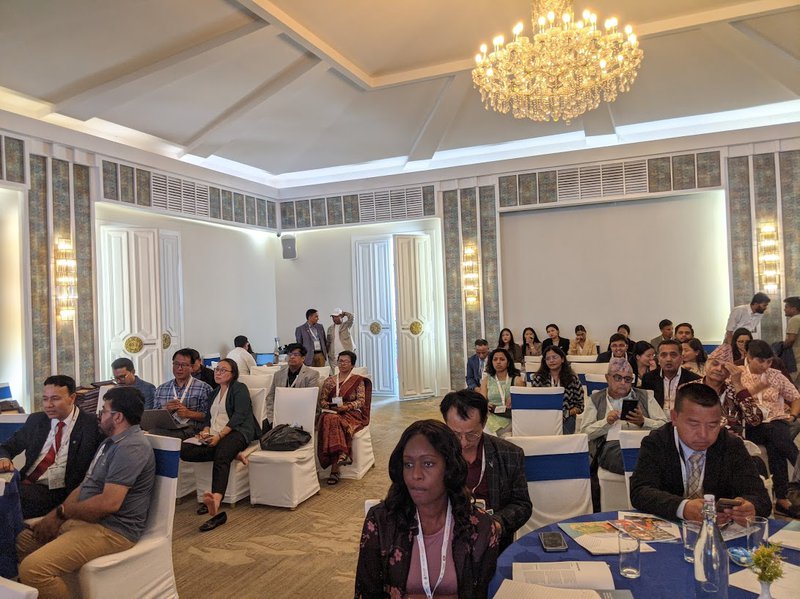
The SoLAR Global Science-Policy Forum, inaugurated by Shakti Bahadur Basnet, Minister of Energy, Water Resources, and Irrigation, commenced in Kathmandu, where solar irrigation systems were extensively shared and deliberated upon. Minister Basnet emphasized in his opening speech that Nepal's water resource policies prioritize solar irrigation as a means to enhance productivity and ensure food security.
Expressing gratitude to IWMI for organizing the international conference on solar irrigation in Nepal, Minister Basnet expressed optimism that this initiative would significantly benefit farmers worldwide, particularly in South Asia. Dr. Danielle Meuwly, the Ambassador of Switzerland to Nepal, highlighted the importance of the 3-day Global Forum on Solar Irrigation for Agricultural Resilience in South Asia, emphasizing the valuable discussions held among 150 stakeholders on the role of solar applications in agriculture and the exchange of ideas and strategies for a sustainable future.
Despite the potential to explore groundwater for irrigation, farmers are encountering challenges in utilizing it due to the lack of electricity and the high operational costs associated with diesel-powered water pumps. Nepal's experience over the past few years has shown that solar-powered pump sets can help overcome these obstacles. However, concerns about the excessive extraction of groundwater in vulnerable areas persist. The reliability and scalability of solar irrigation have not yet reached their full potential. Therefore, the organization of the three-day international conference by the International Water Management Institute (IWMI) and its partners, the Global Forum, under the Swiss Agency for Development and Cooperation (SDC) funded project SoLAR, is of great importance.
Dr. Mark Smith, Director General of IWMI, has emphasized that solar irrigation systems can play a crucial role in sustainable development, enhancing resilience in water, energy, food, and climate.
He highlighted that IWMI's solar project in South Asia is leading the way towards sustainable solutions, ambitious policies, and inclusive investments. Keshab Kumar Sharma, Secretary of WECS in Nepal, stressed the importance of science-policy dialogues like this conference in promoting global cooperation and bridging the gap between scientific knowledge and implementation. Sharma emphasized that recognizing solar irrigation as a priority is essential to ensuring food security.
Dr. Manohara Khadka, the country representative of IWMI, warmly welcomed the delegation members and emphasized the significance of international conferences on solar irrigation systems. She highlighted that solar-powered irrigation technologies are beneficial for women farmers as they are user-friendly and help save time, ensuring energy for water security.
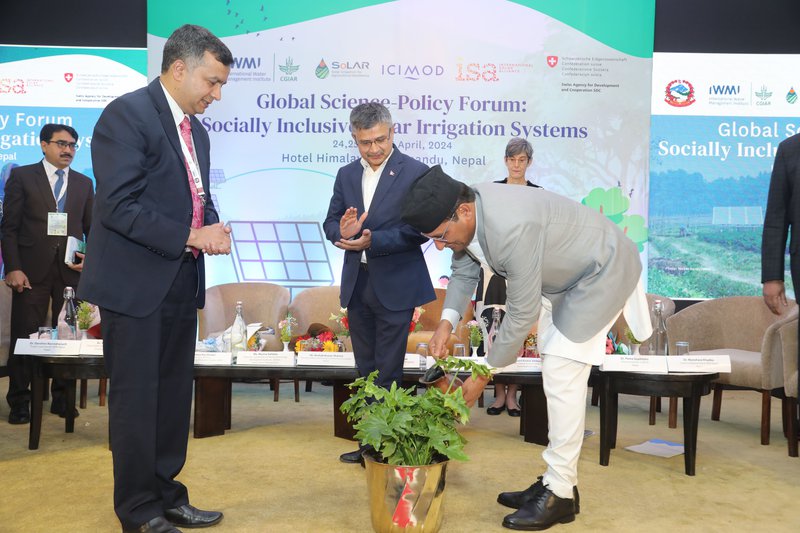
During her presentation, Dr. Darshini Ravindranath, the project leader of SoLAR at IWMI, discussed the solarization of agriculture in South Asia, considering the rapidly changing climate.
Dr. Pema Gyamtsho, the Director General of ICIMOD-Nepal, expressed that solar irrigation systems are a practical solution for irrigation in South Asia. He mentioned that ICIMOD has been actively involved in this field.
Asghar Ali Helepoto, the Chief of the Water Resources Section at the Ministry of Planning, Development, and Special Initiatives in Pakistan, also shared his thoughts on the program. Additionally, Sunil Kumar Ambast, the Chairman of the Central Groundwater Board in the Government of India, and Munira Sultana, the Chairman of the Sustainable and Renewable Energy Development Authority of Bangladesh, spoke about the benefits of solar-powered irrigation.
Shisher Shrestha, the country lead for SoLAR in Nepal, emphasized that solar irrigation is a proven climate-smart solution. He emphasized the importance of collaboration with policymakers to enhance its scalability, inclusivity, and sustainability. This approach can transform farmers' livelihoods while actively mitigating and adapting to climate change.
In Kathmandu, over 150 stakeholders have gathered to discuss and strategize on the implementation of inclusive and sustainable solar irrigation. This important event, known as the Global Science-Policy Forum, is being organized by the Swiss Development Cooperation. Dr. Danielle Meuwly, the Ambassador of Switzerland to Nepal, expressed her support for the project "Solar Irrigation for Agricultural Resilience in South Asia" through a tweet.
The need for transitioning to solar panels in the irrigation sector is evident, considering the declining process and the importance of energy security. With more than 200 participants from approximately 20 countries, the three-day forum aims to address this issue and explore potential solutions.
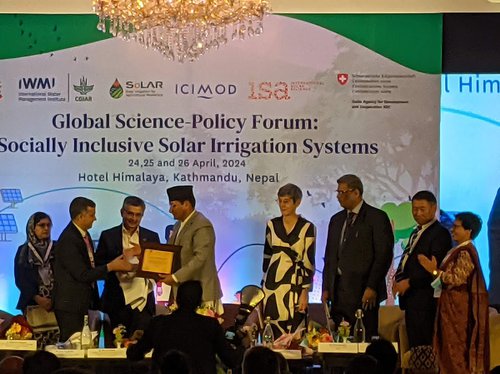
Irrigation has proven to be an effective strategy in building resilience, particularly in South Asia. It has helped mitigate the impact of changing rainfall patterns, improved crop yields, and provided opportunities for livelihood diversification. However, access to irrigation remains a challenge for women and marginalized farmers due to various factors.
Climate change poses a significant global challenge, particularly for countries in the Global South. These countries face climate variability on a large scale and are highly vulnerable due to low levels of climate readiness and high levels of fragility. The agricultural sector, in particular, is at risk due to its dependence on weather and climatic conditions. Climate change directly affects crop yields, livestock, soil and water resources, thereby impacting food and livelihood security.
At the same time, agriculture contributes significantly to Greenhouse Gas Emissions (GHG) both directly (through on-farm emissions related to production, such as diesel irrigation) and indirectly (through changes in land use due to agricultural expansion).
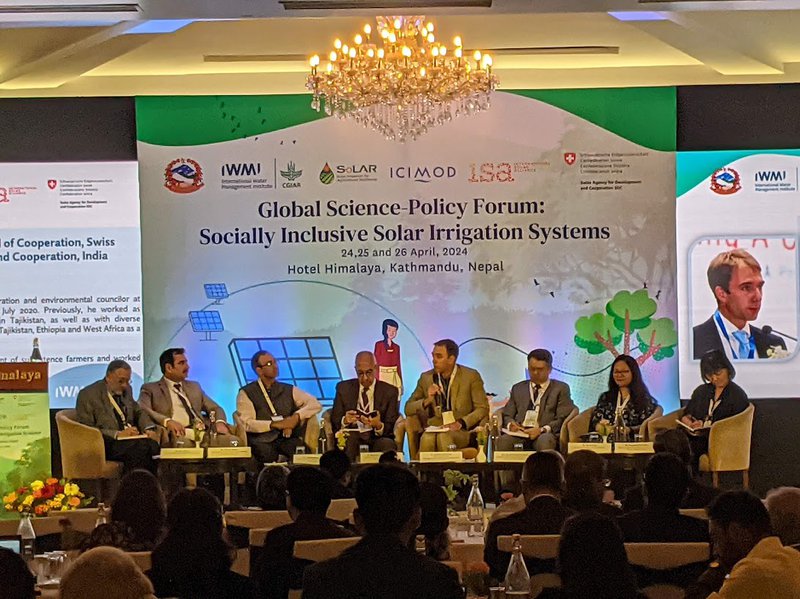
Irrigation has proven to be an effective strategy for building resilience in many regions of the Global South, particularly in South Asia. It has helped reduce vulnerability to changing rainfall patterns, increase crop yields, and enable the diversification of livelihoods. However, there are various factors that limit access to irrigation, especially for women and marginalized farmers.
In certain parts of East/West Africa and MENA, there is a lack of accessible, clean, and affordable energy for irrigation purposes. In South Asia, irrigation is becoming increasingly energy-intensive, with groundwater irrigation alone accounting for 11-12% of the region's agricultural emissions.
Solar energy, specifically the use of solar irrigation pumps (SIPs), provides a reliable alternative to unreliable power supply and expensive, high-emission diesel pumps. There is emerging evidence that demonstrates the transformative potential of SIPs in terms of livelihoods, agri-food systems, and empowering women and marginalized groups in climate-resilient irrigation practices that create opportunities for livelihoods.
Communities that have adopted these systems have reported higher crop yields, longer growing seasons, and increased income generation. With a consistent water supply, farmers can diversify their crops, improve food security, and enhance their economic well-being.
However, questions often arise regarding the actual impacts on mitigation and adaptation, which can truncate the optimism surrounding the use of Solar Irrigation Pumps (SIPs). The challenges of equity and inclusion in accessing and controlling SIPs persist due to the high costs and technical requirements involved, as well as the limited understanding of SIPs from various perspectives. Concerns about the potential over-extraction of groundwater in vulnerable areas also remain a significant issue, hindering the replicability and scalability of solar irrigation. The International Water Management Institute (IWMI) and its partners are hosting a three-day Global Forum supported by the Swiss Agency for Development and Cooperation (SDC) under the project Solar Irrigation for Agricultural Resilience in South Asia (SoLAR). This event will convene 150 key stakeholders worldwide to deliberate on the growing body of evidence on solar applications in agriculture in South Asia. The forum aims to share experiences, insights, and promote collaboration among countries in the region, as well as scale up global efforts towards the effective and sustainable use of solar energy in agriculture. By leveraging lessons from South Asia, the forum will offer valuable insights on the role of solar irrigation in managing water, energy, food, and climate in a sustainable manner.
The event will showcase how governments utilize field evidence to create and implement ambitious policies and programs on solar irrigation to meet nationally determined contributions (NDC) while promoting climate-resilient, gender-equitable, and socially inclusive agrarian livelihoods. Scope and Objectives
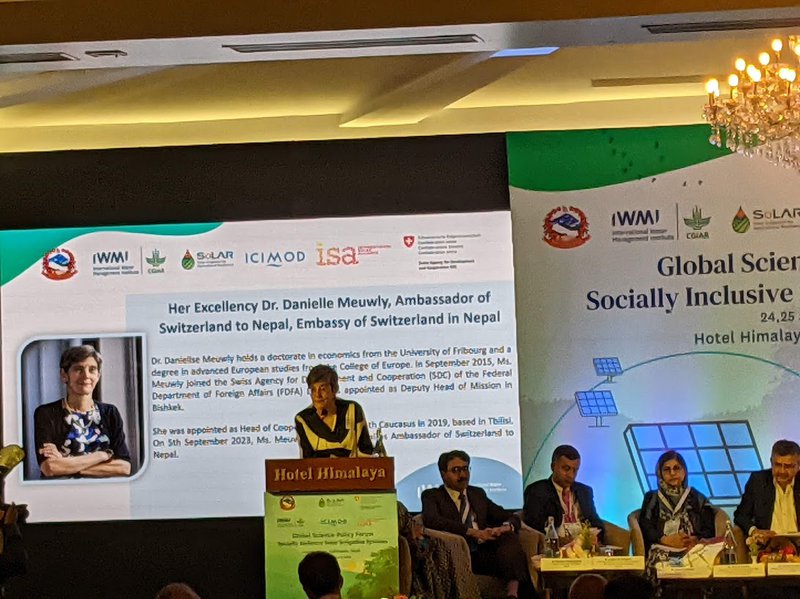
The primary goals of the forum include: 1. Presenting key insights from South Asia on the effectiveness of solar irrigation in sustainable agri-food systems. 2. Providing a platform for policymakers, public and private sector partners, and scientists to share ideas and experiences on overcoming barriers and seizing opportunities in solar irrigation adoption, with a focus on gender and social inclusion. 3. Sharing innovative approaches for fostering south-south collaboration to globally expand equitable and inclusive solar irrigation, along with suggestions for future research.
Throughout the three-day conference, there will be plenary and parallel sessions featuring presentations and diverse panels covering four main thematic areas such as groundwater sustainability, adaptation and mitigation, business models of SIPs, and scaling up solar irrigation. The discussions will also delve into the roles of communities, capacity building, gender, equity, and social inclusion, as well as the development of effective policies for solar energy transitions.
As the first day of the meeting concluded, IWMI anticipates that the forum will address various topics, including capacity building, gender equity promotion, and social inclusion.

Keshab Poudel
Poudel is the editor of New Spotlight Magazine.
- IFAD/MoICS’s SMRIDDHI: Retaining Returnee Workers
- May 03, 2024
- MoICS/IFAD: SAMRIDDHI’S Leading To Apprenticeship
- May 01, 2024
- MoICS AND IFAD: SAMRIDDHI For Entrepreneur And Employment
- Apr 29, 2024
- CLA: Samriddhi For Skill Development
- Apr 23, 2024
- ECONOMY: Growth At 3.3
- Apr 16, 2024

